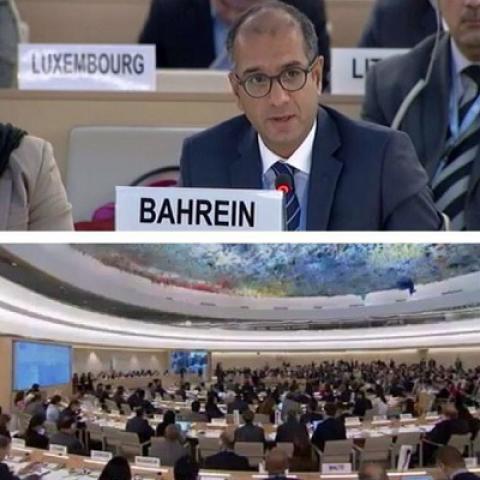
On 22 September 2016, Alkarama submitted its report on Bahrain’s human rights situation to the Human Rights Council, in view of Bahrain’s Universal Periodic Review (UPR) which will be held in May 2017. In its report, Alkarama underscored the most serious human rights violations which continue to persist in the country, such as the use of torture, the recourse to arbitrary detention and the violations of fair trial rights. Alkarama’s report also points out the lack of implementation of several recommendations accepted by Bahrain during its second UPR in 2012.
In its report, Alkarama condemns the repression against the opposition, which results in abusive arrests, often for political reasons, travel bans or stripping of nationality. The arrest of the Secretary General of the country’s main opposition party, the deprivation of many opponents and the recent dissolution of the party, fit into a wider pattern of violations of fundamental freedoms, particularly the rights to freedom of opinion and expression as well as peaceful assembly and association.
Alkarama further underlines the oppressive nature of the 2006 Anti-Terrorism Law, which continues to limit these fundamental freedoms and threatens peaceful activists, human rights defenders and members of the opposition. Many of them have been prosecuted for “criticising” the government on social media or during public gatherings and the authorities continue to detain prisoners of conscience convicted after unfair trials.
Despite the ratification by Bahrain of the Convention against Torture (UNCAT), torture remains a persistent practice in the country. The cases documented by Alkarama have shown that torture is carried out in order to obtain confessions, which will then be admitted in trials as evidence to sentence the accused. Torture is generally used by officials falling under the authority of the Ministry of Interior who act in complete impunity.
In addition, Alkarama denounces the continued practice of arbitrary detention to silence peaceful dissidents and human rights defenders. Arrests, particularly of peaceful protestors, are often carried out by members of the police or Special Forces of the National Security, with an excessive use of violence. The cases documented by Alkarama also underline the common practice of incommunicado detention, which makes it impossible for detainees to communicate with their lawyers and their families, creating a breeding ground for torture.
Such practices go hand in hand with the violation of the right to a fair trial. Indeed, secret detention, the denial of access to a lawyer before the trial to prepare the defence, and the use of confessions obtained under torture are all major flaws of the Bahraini judicial system. Similarly, judicial bodies such as the military tribunals and the National Safety Court, do not offer sufficient judicial guarantees to protect the rights of the accused. These jurisdictions, under royal control, lack independence and can therefore be considered as special courts.
The UPR involves a review of the human rights record of all UN Member States by the HRC every four years. The reviews take place through an interactive discussion between the State under review and other UN Member States. NGOs can submit information which can be referred to by any of the States taking part in the interactive discussion. In May 2017, it will be the third time Bahrain will be reviewed in the framework of the UPR.
For more information or an interview, please contact media@alkarama.org (Dir: +41 22 734 1008)
